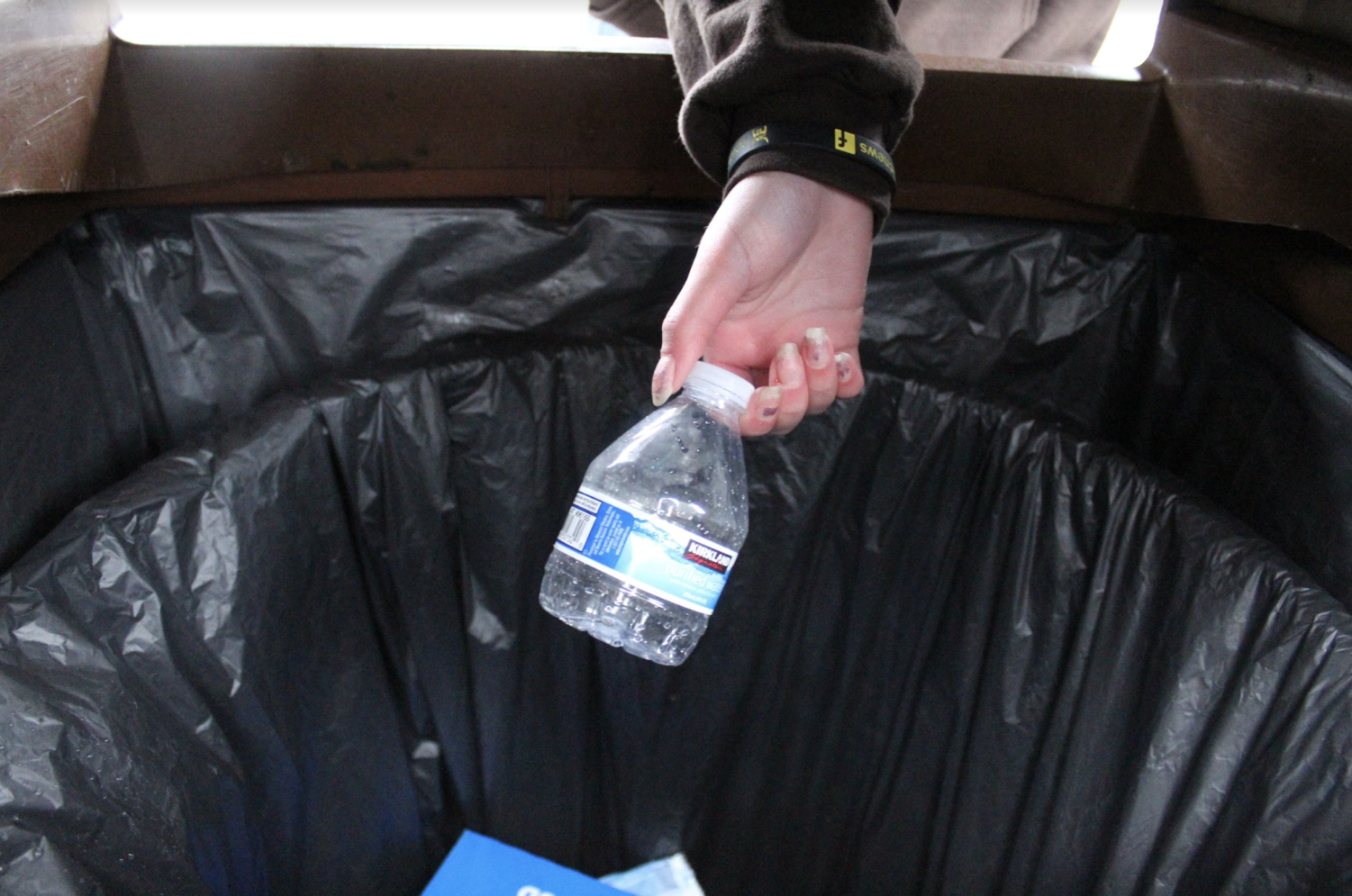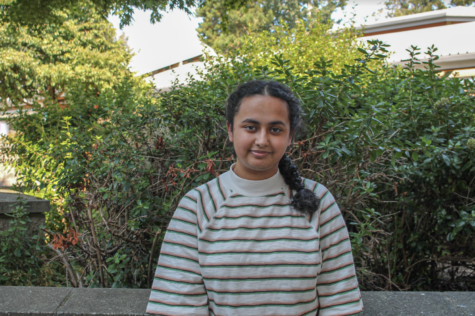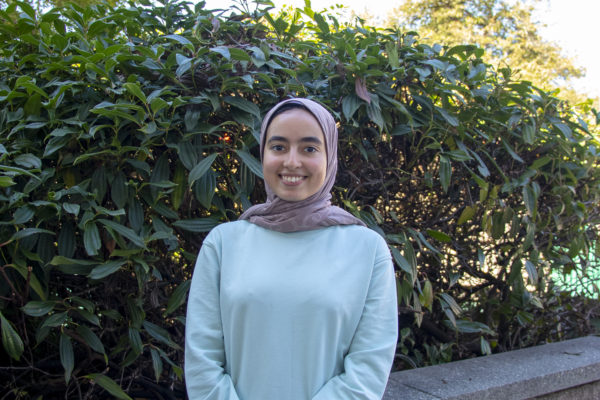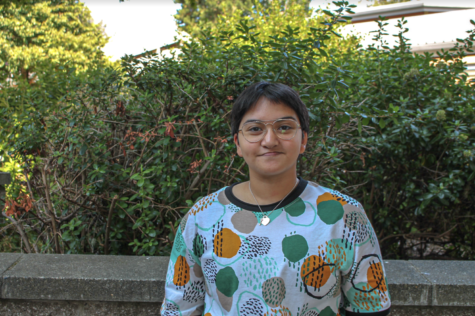In June 2019, Inglemoor was recognized as a level one school for its impressive recycling habits, energy conservation and commitment to reducing paper waste by the Green School’s Program. However, four years later, Inglemoor’s recycling habits need to be revisited.
According to facility manager Sofia Jennings (she/her), despite the presence of three designated containers for recycling, trash and compost, a significant number of students continue to indiscriminately dispose of their waste in any bin. Jennings also said that the worst recycling situation is in the cafeteria. Occasionally, Jennings herself will try to separate the mixed waste, but this solution isn’t something that she can do every day. Therefore, the magnitude of the problem and the limited resources at her disposal render her efforts useless.
Earth Corps’ communication officer, junior Nicole Ronkin (she/her), believes the recycling issue comes down to carelessness and people feeling a lack of connection with the problem. Ultimately, Ronkin feels this lack of concern for proper waste management comes down to the sorts of messages the administration sends. Ronkin said the administration generally places a lot of emphasis on the four pillars: respectfulness, accountability, engagement and safety. She believes that if the administration emphasized recycling as an aspect of respectfulness and accountability, there would be more positive change. The administration tried to do this last year by using GMI a couple of times to encourage students to recycle. However, this may need to be implemented more frequently again this year.
“I think it’d be really helpful if Inglemoor started to push for more transparency and public data like, ‘This is where your recycling goes. This is what happens when you don’t recycle. This is the carbon impact of recycling versus not recycling.’ Because I think they could,” said Ronkin.
Conversely to Ronkin’s belief that recycling is due to carelessness, German teacher and Earth Corps club advisor Katrin Vince (she/her) believes students are well-intentioned but ill-informed. From what she sees in her classroom, students are mindful of what they throw in the waste bins.
“I think educating students and maybe putting signs above the recycling that have clear, ‘This is what goes here. This is what goes there.’ I think [it’s better] to not make assumptions that people already know because they don’t necessarily,” said Vince.
Vince also mentions that poor recycling habits could stem from how students see it done at home. She points out that different cultures don’t have the same recycling system as the U.S.. Vince has experienced this dilemma firsthand, being from Germany, where there are separate recycling bins for metals, plastics and glass.
“We are a very diverse school. People come from a different country where, again, they don’t know how this thing works. So, I think it is our responsibility to educate our students on how we recycle here in the United States,” said Vince.
Before the COVID-19 pandemic, Inglemoor had reusable food utensils and water fountains. The school now uses individually wrapped plastic utensils and has limited working water fountains, leading to an increase in the use of plastic bottles. In Bellevue School District, 17 out of 18 schools transitioned from plastic spork kits to washable, reusable silverware. This change inspired the removal of plastic straws, too. But at Inglemoor, reusable utensils aren’t a reality — or at least, they aren’t anymore.
Principal Adam Desautels (he/him) said that the reason reusable utensils aren’t back after COVID is because of prohibitive costs. Desautels said he hopes to see reusable utensils and/or compostable utensils in the future and thinks it’s something to be considered, even though both options are more expensive.
“The best way to get change in terms of improving environmental factors is to make it not cost more than the waste,” said Desautels. “[Reusable utensils] went out after COVID because money’s tighter. But if there was somebody that was gonna give a grant, or something like that, we would definitely bring it back. It’s definitely worthwhile.”
Earth Corps or other organizations can apply for grants from PTSA or the Northshore Schools Foundation, a local-non profit that is separate from NSD, to help bring those. reusable utensils back.
After the remodel, the administration aims to make sustainability a greater priority. For example, Inglemoor is looking into using geothermal cooling and heating.
“We’re just starting work on the planning of the remodel, and the architects were very interested in connecting with our Earth Corps and getting them to help,” said assistant principal Shawn Rainwater (he/him).
Rainwater believes that the right amount of influence on students will help them build better recycling habits.
“If we had a campaign to say purple is the best color around here, and we kept saying ‘purple is the best color,’ ‘purple is the best color,’ I guarantee you, you would see more purple around here,” said Rainwater.
Rainwater has spoken with Vince about awareness around garbage classification, and they have compiled various ideas for solutions. These ideas include making GMI announcements and stationing people by the cans to help students figure out which items go in which containers to lock in the habit. More than anything, Rainwater believes Inglemoor could improve at composting
“We could compost better. There’s a lot of stuff that goes in garbage and recycling that should be going into compost,” said Rainwater.
Former Earth Corps advisor and science department head Suzanne Black (she/her) believes that instead of having administration and teachers take the lead, it should be students who educate their peers about recycling.
“Sure, teachers can do it, but I think having peers help their own classmates is probably the most effective. It just might seem a little bit less preachy, and a little bit more, ‘This is how we do this at Inglemoor,’” said Black.
Additionally, Black believes if more students participated in Earth Corps through a forum, different ideas on how to solve these waste management issues could be shared, and more students could take the initiative to change how they recycle.
“Everybody wants to do the right thing. It just has to be easy. They have to understand what they want to do.”













